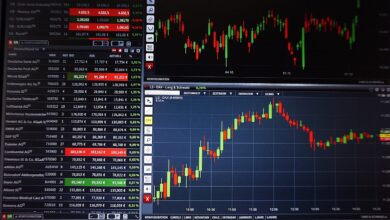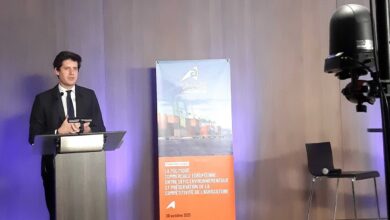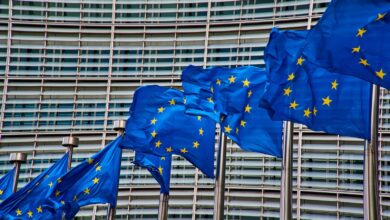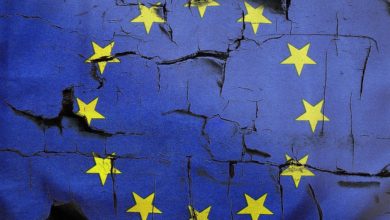
In the opening of the agricultural fair, President Macron delivered a dense programmatic speech where, a few weeks before the European elections, he calls for reinventing the CAP and renewing multilateralism. Articulated around three “promises”, namely a promise of protection for farmers and consumers, a promise of transformation “of our model to more value and ever more ecology” and a promise of anticipation “by focusing on research and ensuring the renewal of generations “, this speech also announces a new law on agricultural land in the short term.
While the beginning of the mandate was marked by the General States of Food, and an adjoining law, which mainly focused on national issues, this speech marks the first declension of President Macron’s European ambition in agriculture. . Positioning itself as “the patriot of our agriculture”, he calls for a “protective, pragmatic, ambitious European agricultural policy”, pleading for European unity, thus reversing proposals for a renationalisation of the CAP.
Taking the antithesis of the previously dominant discourse on the CAP where it is to be the good students of the rules of the WTO and to reduce the CAP to its only environmental dimension, it identifies the main dangers of the CAP: the the external threat of “an international order which, by considering food as a commodity among others, has finally lost its soul” and the internal threat of “a cap reduced to acquests”.
Echoing his previous speeches on Europe, the imperative of food sovereignty is broken down by various examples, notably to plead an “ambitious plan of proteins on a continental scale”. It is therefore for President Macron that the “European commercial policy [is] consistent” by refusing that trade agreements allow to import “products that do not meet European standards […] environmental, health and social.”
A protective CAP
The terms “protect” and “protect” come back 28 times throughout the speech. The need for protection is also expressed with regard to the CAP budget which “must reflect the consequences of Brexit but no more and not for one more euro”. However, it is not specified whether these are current euros or constant euros. To have a budget for a “protected CAP” requires a stable budget in constant euros, but also to focus on the most effective tools, those that give the CAP a real Community added value. This is what the President of the Republic advocates by calling for “a real risk management strategy” based on three levels.
The first is at the Community level via “a crisis reserve, multiannual, reactive to protect all Member States from the impact of market crises”. The example of the aid to the voluntary reduction of milk production implemented in 2016 is cited, while underlining that its recourse could have been earlier to avoid the formation of stocks of powder that the Commission has had so much hard to get rid of. The second level refers to the sectors and the responsibility of the actors, where it is referred to as “regulation mechanisms of the sectors” and a better articulation between “private devices […] and public risk management tools”. Finally, the third level is that of exploitation, where crop diversification and support for changing practices must make it possible to “adapt better to climate change” in a logic of prevention.
While the President is paving the way for genuine market management through better coordination between regulatory measures and the empowerment of private actors in the face of risks, he does not call for letting go of the prey for the shadows. per hectare will remain necessary as they “provide a safety net for farmers”. We understand that the President on this point remains cautious, but at a time when the United States is tackling decoupled aids in the Spanish olives case, there is no doubt that other tools such as counter-cyclical aids, which are they too, per hectare aid, must emerge within the CAP.
Transformation towards quality and ecology at the heart of a new pact between farmers and society
Taking the example of wheat, where European exports are increasingly competing with Russia and Ukraine, Emmanuel Macron calls for building differentiation strategies because “neither our geography, nor our social model, nor our environmental ambition” allow us to participate in the “mortifer competition of the lowest price”. The “fight for value” goes hand in hand with protecting the environment.
Convinced that “farmers are, more than anyone, committed to the protection of the planet”, the President calls to overcome the image of the farmer resistant to change, and stresses that these are the first concerned by these issues. Nevertheless, the transition will only be possible if farmers “can live with dignity while driving these changes for our environment”. Here too it is appropriate that “the public authorities create the conditions for this transition”, which implies in particular that a “significant share of the next CAP will be devoted to the environment”. These funds could be mobilized to “pay for environmental services rendered by farmers”.
In short, he believes that “it is the very identity of Europe to reconcile the economy and the ecology in a progressive, pragmatic and realistic project”.
Anticipating : research and generational renewal
The third promise, to anticipate, directly concerns research and public expertise whose missions are clearly reaffirmed. At the European level, President Macron wants to see the reinforcement of the means of control in matters of health security. These issues are also declining at the French level where he “wants INRA, the first institute of agricultural research in Europe and the second in the world, to invest more in the economic field by working with the technical institutes of the sectors, the chambers of agriculture” to better accompany changes in practices.
In a speech in which the President addresses the youth and the future farmers on several occasions, the issue of the renewal of the generations takes an important place. Given a very worrying age pyramid of farmers, it is a question of “creating new vocations” because “a society that does not value the work of the land that does not look after those who cultivate, who are a society in danger of death, it is a society that builds the conditions for not being able to feed itself in a world more and more uncertain “.
The lever of access to agricultural land is clearly identified. The artificialisation of land requires “a real change in the organization of our urbanism and our practices”. And in the face of the phenomenon of land concentration, a land law is announced as well as specific provisions in the context of the CAP negotiations to facilitate access to land for young farmers.
Invent a new global contract
After having articulated in the form of three “promises” France’s priorities in the negotiations, President Macron concludes his statement by restating the major underlying issue for the European construction: reinventing the CAP is the means for the Europe to regain greater credibility on the international scene to be “on the offensive, by carrying out a profound overhaul of commercial rules […] designed almost 30 years ago and become obsolete”.
World Food Security “is a challenge that will not be overcome by the single invisible hand of the market, nor by the law of the fittest, but by dialogue, by renewed multilateralism, by the lucid awareness we share in the same planet, the responsibility of its destiny and that of humanity “. It is therefore a question of “inventing a new global contract” and not of “accommodating ourselves in a form of guilty immobility”, it is the agenda that Emmanuel Macron wishes to carry within the framework of the French presidency of the G7 .
Agriculture Strategies can only support the President’s political vision, as the reforms he calls for are in line with his recommendations expressed in the two strategic reference notes: “For an in-depth reform of the CAP in a multilateral framework to renew “and” For an in-depth reform of multilateralism “. It remains to start a process of reforms that we know will face many obstacles, both the CAP and the multilateral doctrine of the European Union are blocked by ideologies that have hitherto prevented any development.












